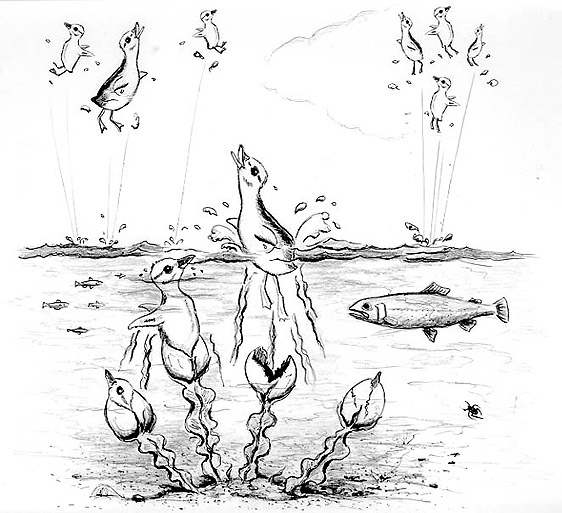
Dear Bird Folks,
I just came back from fishing on Scargo Lake in Dennis, (MA), where my favorite area was posted: “Caution Nautilus Duck nesting area.” First of all, what is a Nautilus Duck? And most importantly, is this bird going to keep me away from my favorite pond like the Piping Plovers keep people from driving on the beach?
– Ron, Dennis, MA
Relax, Ron,
Don’t start any rumors about more beach closures. Do you want a riot to break out? What is it with people and their beach obsession? You could take some people’s children away and they would say: “Okay, but the beach will still be open, right?” Yes, your beach will still be open. Well, most of the time it will be open. A small area on Scargo Lake will be closed to some public access when the nautilus ducklings are hatching out. I believe Scargo Lake has five Nautilus Duck nests, so there’ll be a lot of action. But unlike plovers, which seem to milk the nesting process, these birds are up and done in one day. Plus, a Nautilus Duck’s hatching is such a spectacle that anyone lucky enough to witness it won’t mind if the area is closed for a few hours.
The adult Nautilus Duck is nothing special to look at. Both the male and female birds are a generic, boring brown. They look like a cross between a female Mallard and a lunch bag. I’m sure most people have seen Nautilus Ducks before but probably didn’t pay much attention to them. However dull they may be, their nesting habits make Nautilus Ducks standout from any bird you’ve read about or ever seen on TV.
Most of the year Nautilus Ducks act like any other puddle duck, quietly feeding in area bogs and marshes. But when the breeding season arrives they become more like creatures found on the Sci-Fi Channel. Instead of building a nice cozy nest of dried grass and downy feathers, these nutty birds lay their eggs underwater. Working mostly at night, the female dives to the bottom of the pond and deposits an egg on the branches of an aquatic vine. Her eggs aren’t hard-shelled like a chicken’s eggs would be; they are soft and gelatinous, somewhat like frogs’ eggs. Over the next two weeks, twelve to fourteen eggs are laid on the same vine.
The female Nautilus Duck can’t sit and incubate her eggs because she can’t remain underwater longer than a minute or two. Instead, she gets help from an unlikely source. The surfaces of her eggs are coated with a tacky enzyme called “clingbryo” that not only holds the eggs securely to the plant, but also allows the eggs to draw oxygen and nutrients from the plant itself. The Nautilus Duck’s “nest” looks like an underwater pumpkin patch. With nutrition provided by the host plant, the chicks grow rapidly. After twenty-seven days the little birds are ready to hatch. This is when things really get crazy.
The hatching process for most birds is slow and drawn out. It typically takes hours for a chick to crawl out of its egg. This can’t be the case for baby Nautilus Ducks because they’d drown; so nature has developed a way to bring the little birds to the surface in less than a second. A chemical reaction causes all the eggs to split open at the same time. The pressure from the surrounding water collapses the eggs and blasts the chicks towards the surface. This process is like when we bite into a cherry tomato and the gooey insides squirt onto the person sitting next to us. The birds shoot towards the surface with such force they actually become airborne, often rocketing twenty feet above the pond. The tiny chicks, which seconds earlier were snug inside their little shells, are now hurtling through the air. No worries, though; the ducklings simply open up their stubby wings and glide safely back down to earth. Well, they’ll glide safely if the wind isn’t blowing. If the day happens to be windy, some of the helpless chicks may end up in the surrounding trees and bushes, and will need our help.
As I mentioned earlier, there are at least five known Nautilus Ducks breeding in Scargo Lake. Because the egg hatchings are triggered by chemical changes in the water, every egg that is laid this spring will burst open at the same time, creating an instant spectacle. With nearly seventy ducklings blasting into the air at once this is a natural phenomenon that should not be missed. (Although Nautilus Ducks nest in several other Cape Cod ponds, Scargo Lake in Dennis, is the only site that is easily accessible to the public.) By studying water samples researchers are able to pinpoint, within an hour or two, when this hatching will take place. The Scargo Lake birds are expected to hatch around 11:00 AM this coming Wednesday. If you’ve never seen this show before, you definitely should get down there. Plan to arrive early because this event always draws a crowd. (Look for a small Scargo Lake sign on the south side of Rt. 6A in Dennis.) Also, if you have a small butterfly or fishing net, you should take it along. You may be asked to help pluck a duckling or two out of a bush. Remember, it’s this coming Wednesday, April 1st.